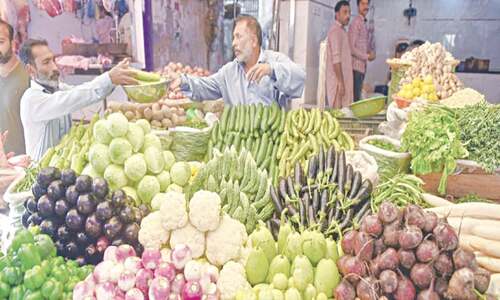HYDERABAD: Apart from usual hike in prices of commodities and fruits ahead of Ramazan, this time round an extended winter into March has also played a role in hampering growth in vegetables and fruits, thus leading to inadequate supplies reaching retail markets and further raising the rates. The price spiral has affected consumers not only from low-income groups but the middle-class as well.
Vegetables like okra, tomatoes, cabbage and fruits like melon are unavailable in required quantities in markets while the fasting month is about to begin.
Consumers are seen opting for wholesale vegetable markets to avoid impact of inflation and price-hike thus saving a substantial amount to meet other expenses in the holy month. Bulk supplies of vegetables are reported from wholesale market.
“Weather has been showing variation indeed,” said Mahmood Nawaz Shah, a progressive grower and owner of vegetable and mango orchard. He has set up a ‘weather station’ in his farmland which, he said, showed 10 to 11 degrees Celsius temperature.
“It has dropped to even seven or eight degrees Celsius in the ongoing second spell of winter that is being experienced in March,” he said. He agrees that this has been an abnormal weather condition for vegetables and fruits.
Artificial price-hike
Veggies are considered to be sensitive. Market players always capitalise on vegetables and fruits ahead of Ramazan by jacking up rates and justify this by attributing the trend to a wide gap between demand and supply. The extended winter has affected okra, which is largely used with the commencement of summer.
Nadeem Shah, who grows onion regularly, says that okra has perished due to the cold. “I feel the crop will have to be re-cultivated,” he said. In March last year, cotton – a summer crop — had shown germination which is not the case this year, he points out.
Market players capitalise on shortage, increased demand ahead of Ramazan
According to Haji Shabbir Kashmir, okra’s 40kg bag is selling at Rs6,000 to Rs7,000 (or Rs200 per kilo in retail) these days when compared with last year’s price of Rs3,000 to Rs4,000 per 40kg (or Rs125 per kg in retail).
Similarly, he says, a 16kg bag of tomatoes is offered at Rs2,200 when compared with last year’s price of R400 to Rs500. “Okra is arriving in market with short intervals due to unfavourable weather conditions and that’s why consumers have to pay more for it than what they usually pay in summer,” he said.
No mechanism to regulate cultivation
Haji Shabbir also notes that since there is no mechanism in place to regulate major crops, vegetables or fruits, growers often go for an overkill of any particular fruit or vegetable for making an extra buck; and this crashes the market. Come next year, he argues, it leads to inadequate supplies or simple shortage of this very commodity. Not only consumers but growers suffer alike financially, he says.
Onion – a vital cooking ingredient – is grown mainly in Sindh and meets requirement of the rest of the country. It keeps coming up, more or less, throughout the year due to different cultivation and harvesting cycles.
To quote Nadeem Shah, last year major quantum of onion crop was destroyed due to some known disease. Shortfall in onion cultivation seems to be still affecting its cycle as far as market supplies are concerned.
Official prices
Price lists are issued by the Market Committee Hyderabad but a survey indicates that the retail prices offered to consumers show a noticeable difference as against the official prices. “The prices will increase even further with the beginning of Ramazan,” says a vendor without demur.
Melons that usually make it to the market by late February or early March are either missing or of low quality. Melon is selling at Rs120 to Rs150 per kg whereas tomatoes are available for Rs180 to Rs160 per kilo.
“Melon is not ripe yet,” remarks Nabi Bux Sathio, a grower from Tando Mohammad Khan. His assessment is that not only that melon is not ripened growth, but it also lacks sweetness. He blamed the prolonged winter which, he believes, has also affected freshly cultivated sugar cane crop.
Fruits like kinnow and guava that are now off-season or have been put in cold storages would be marketed at exponentially higher rates as well. Guava being a winter fruit had been in full supplies until recently. Likewise, sapodilla is doing round in the market for Rs150 or Rs200 per kilo and banana for Rs100 to Rs150 a dozen.
Published in Dawn, March 11th, 2024















































Dear visitor, the comments section is undergoing an overhaul and will return soon.